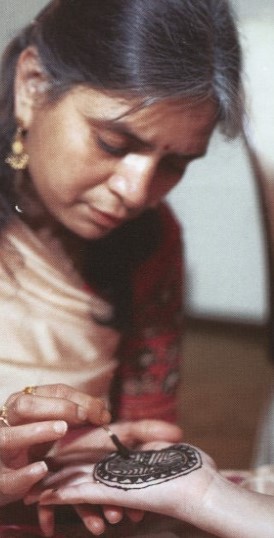Art Form: Meh'ndi (henna application)
Location(s): Okemos (Ingham County)
Pushpa Jain

Pushpa Jain applying henna
The Indian community in Michigan is a multicultural group. Individuals have come from different regions of India with different cultural and social backgrounds, representing different religions, classes, and languages. They are Hindus, Muslims, Jains, Sikhs, Buddhists, Christians, Parsees, and Jews, speaking 16 languages and 225 dialects. With them, they have brought knowledge of traditions that play an important role in their lives as Asian Indians. Meh'ndi (also called mehndi), the art of decorating hands and feet with henna, is an integral part of festive occasions, especially weddings in Hindu, Muslim, and Sikh communities.
Pushpa Jain was born in 1948 in Jaipur, Rajasthan, India, where, at the age of about ten, she began to learn about meh'ndi application from relatives and neighbors. She came to the United States with her family in 1985 and continues to practice the art of meh'ndi in her new community.
Meh'ndi application is something every girl tries; like makeup, a young girl embellishes herself and her friends in play. Pushpa, however, is regarded one of the best in the area and is often deferred to on questions of meh'ndi by others who have had some practice in this art. Her designs are recognized as having "outstanding artistic quality with the cleanest of lines."
Pushpa is a dedicated practitioner of meh'ndi tradition, teaching children and others in her leisure time. The community's gratitude is expressed in the words of one Indian: "Her willingness to work with the children has helped in developing interest in this art in the next generation [not born in India]." (1) She also prepares the hands and feet of dancers before their performances and frequently is called upon to decorate the hands of other female community members in preparation for special events, and of brides for their weddings. Pushpa also readily shares her skill with the greater American community, demonstrating at festivals and at workshops with 4-H'ers and in this way educating others about Indian culture.
(1) Agrawal, Aparna. Letter of support to panelists. 29 November 1993.





